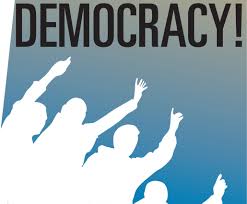记忆方法
记忆“democracy”的方法是将其拆解成两个部分:“demo-”和“-cracy”。“Demo-”部分可以联想到“demo”或“demonstrate”,表示人民或示范;“-cracy”则类似于“ocracy”,表示统治或政体。将这两部分结合起来,可以想象成“人民统治”或“人民示范的政体”,这样就可以记住“democracy”这个单词的含义是“民主”。
以上内容由AI生成, 仅供参考和借鉴
中文词源
democracy 民主制
demo-, 人民。-cracy, 管理,统治。
英语词源
- democracy
-
democracy: [16] Democracy means literally ‘government by the populace at large’. It comes via Old French democratie and medieval Latin dēmocratia from Greek dēmokratíā, a compound formed from demos ‘people’ and -kratíā ‘rule’, a derivative of the noun krátos ‘power, authority’, which has contributed a number of terms for types of government to English.
The original meaning of Greek demos was ‘district, land’, but eventually it came to denote the people living in such a district, particularly the ordinary people considered as a social class participating in government – hence democracy. The derivative democrat [18] was coined in French at the time of the Revolution.
=> epidemic - democracy (n.)
- 1570s, from Middle French démocratie (14c.), from Medieval Latin democratia (13c.), from Greek demokratia "popular government," from demos "common people," originally "district" (see demotic), + kratos "rule, strength" (see -cracy).
Democracy implies that the man must take the responsibility for choosing his rulers and representatives, and for the maintenance of his own 'rights' against the possible and probable encroachments of the government which he has sanctioned to act for him in public matters. [Ezra Pound, "ABC of Economics," 1933]
权威例句
- 1. He said parliament and the process of democracy had been debased.
- 他说议会和民主程序已遭贬值。
- 2. Professor Baker is unacquainted with the idea of representative democracy.
- 贝克教授并不熟悉“代议制民主”这一思想。
- 3. The person who embodies democracy at the local level is the mayor.
- 在地方上代表民主的人是市长。
- 4. The government has cracked down hard on those campaigning for greater democracy.
- 政府严厉镇压了那些发起运动争取更广泛民主的人士。
- 5. Have they, for example, demonstrated a commitment to democracy?
- 例如,他们是否已表现出会致力于民主?
